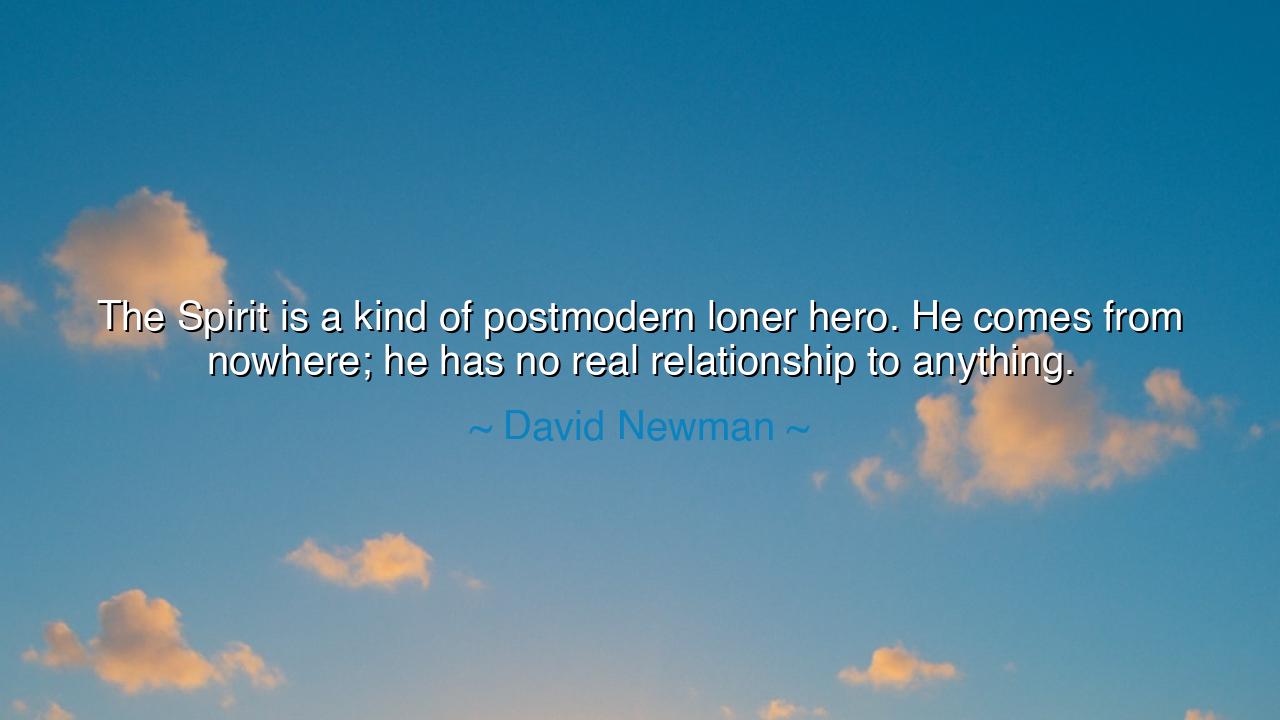
The Spirit is a kind of postmodern loner hero. He comes from
The Spirit is a kind of postmodern loner hero. He comes from nowhere; he has no real relationship to anything.






The learned David Newman speaks of a figure both mysterious and timeless when he declares: “The Spirit is a kind of postmodern loner hero. He comes from nowhere; he has no real relationship to anything.” These words reveal the essence of a wandering archetype, a being who walks the path of solitude, unbound by origin or allegiance. Such a figure is not merely a character in story, but a reflection of the restless human soul in an age where certainty has crumbled and meaning must be forged anew.
To come from nowhere is to emerge without past or lineage, to be free of the ties that bind ordinary men and women. This gives the loner hero both great strength and profound sorrow. With no home to return to and no roots to anchor him, he moves like the wind—appearing suddenly, acting decisively, and vanishing into the shadows. His very existence challenges the world, for he is shaped not by tradition, but by his own choices and the struggles he faces.
When Newman says the Spirit has no true relationship to anything, he speaks of detachment in its most radical form. The loner hero is unclaimed by love, power, or belonging, and thus he stands apart from the societies he drifts through. In this isolation lies both purity and peril: purity, because he is untouched by corruption; peril, because he walks forever at the edge of despair. His battles are often less against external foes and more against the emptiness within himself.
This vision of the postmodern hero arises from a world where the old myths have been shattered. In ages past, heroes were bound to kings, gods, and destinies foretold. But in this later age, the hero wanders through fragmented realities, finding no clear truth, no guiding star. The Spirit, as Newman describes, becomes a symbol of this modern condition—an eternal seeker who fights not for a realm or a people, but simply to assert his existence amidst the void.
Thus, let these words be a lesson to future generations: even when all certainties dissolve and the world offers no clear path, the solitary figure who dares to act becomes a light in the darkness. The loner hero may have no roots, no bonds, and no home, yet his journey speaks to the deepest yearning of the human heart—the desire to create meaning in a universe that offers none.






LTLe Thang
I find the idea of a ‘postmodern loner hero’ to be quite thought-provoking. At first glance, the lack of a relationship seems like a disadvantage, yet there is a certain allure to a hero who doesn’t fit neatly into societal expectations. But is this independence truly empowering? Does it limit The Spirit’s potential to inspire or connect with others, or is it a reflection of the increasingly fragmented world we live in?
MT44 Diep Minh Tuyen
This portrayal of The Spirit seems to challenge the notion of traditional heroes. Most heroes have defined relationships, whether with allies or foes, but here, we have a character who is alone by design. I wonder if this detachment is a commentary on modern society's complexities or perhaps a critique of the loneliness that often accompanies fame and heroism. What does it say about our expectations of heroes in contemporary culture?
GDGold D.dragon
When I read this quote, I couldn't help but think of the struggle many face today — a yearning for connection in an increasingly individualistic world. The Spirit’s detachment might be appealing for some, symbolizing freedom and independence. However, can anyone truly thrive without any meaningful relationship? It raises the question: is solitude empowering, or is it merely a form of emotional isolation that diminishes personal growth and connection?
Nnguyendothienkim
Isn't it interesting how The Spirit, as described, seems to embody the essence of modern disconnection? In a world where so many seek relationships, both personal and professional, he represents the loner archetype, untouched by conventional ties. Does this make him more authentic or more isolated? Could his lack of connection to anything be a strength or a flaw? It’s a compelling thought to ponder, especially in our hyper-connected society.